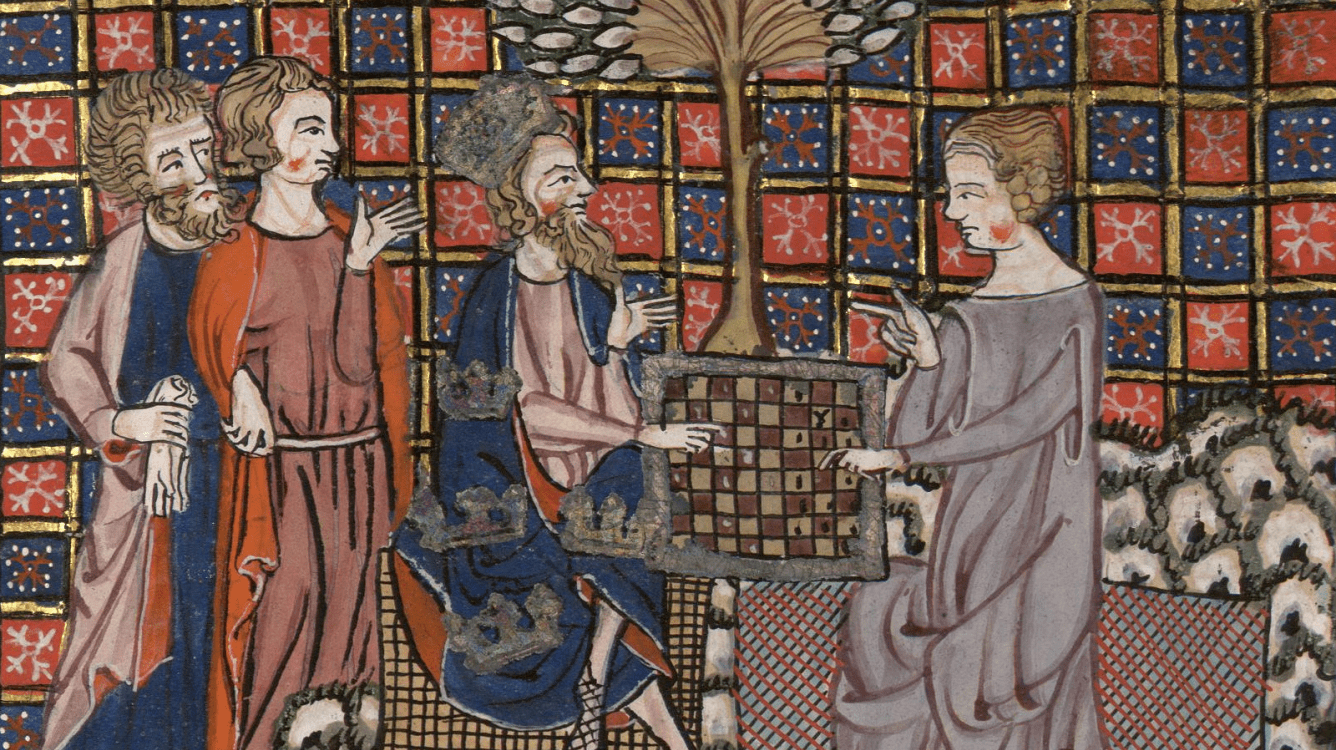
From Odysseus & Troy to Alexander the Great. Greco-Roman cycle... and the invention of chess
Jean Bodel, an Old French poet of the 12th c., had distinguished three great cycles of the medieval chansons de geste; the matter of France [topic of a previous blog], the matter of Britain [on which some aspects here], and the matter of Rome. The latter wasn't only on Roman mythology and legends. It derived its thematology from Greek ones, too. In fact, it contained fewer topics than the other two, while the main sub-cycles, that dominated by far, were the Trojan war and Alexander the great; though in some different versions compared with the original Greek stories and history.
.
The inventor of chess... Odysseus
Benoît de Sainte-Maure, a French poet of the 12th c., was writing in his Roman de Troie that they were the Trojans who first invented chess, tables and dice-games [v. 3183: Eschec e tables, gieu de dez]. Guido de Columnis, an Italian author, repeated this approach towards the end of the 13th c. in his Historia destructionis Troiae in Latin [liber V]; and he was cited by John Lydgate in the Troy Book of the early 15th c. [II.806-815].
However, without leaving the area of the Trojan war, other more detailed medieval treatises were giving Ulysses as the inventor. So seemed supported by Alexander Neckam in 1190 ca, in his De naturis rerum [ch. 184, De scaccis]. Opinion repeated in De Vetula of the 13th c. [v.600] and in the beginnings of the so-called Cracow poem of 1422. Ulysses is also mentioned [along with Philometer] as the chess inventor in the Esches Amoureux, the famous work written by Evrard de Conty in the late 14th c.

In 1400 ca Christine de Pisan published her Épistre de Othéa a Hector. A work inspired by the Trojan mythology, where Hector is advised on political issues by the fictional goddess Othea. At an instance Ulysses is presented as the chess inventor. Luckily this was a work with some illustrated editions...



Ulysses was the latin name-version of Odysseus, the famous bright king of Ithaca, the inventor of the Trojan Horse, who afterwards lost his way back in the seas while trying to return home; according to Homer. A personage inspiring many works till our days. On Ulysses' version of chess disccovery Murray [1913, p. 501] was writing: 'I have not been able to discover its source'. But I believe that perhaps it's based on an ancient Greek legend, though altered to a big degree.
In ancient Greece the god protector of games was Hermes. However when coming to more specific game inventions, the name of Palamedes is coming up. Palamedes was a hero participating in the Trojan war. But he isn't mentioned in the great epics by Homer. He's a leading personage in other versions of the Trojan story, like in Cypria. The latter being a lost now epic of possibly late 7th c. BCE, describing events that preceded the ones in Homer's Iliad, like an introduction; quotes and summaries of it surviving in later texts.
Palamedes became a more popular hero in classical antiquity. Since at least 5th c. BCE texts can be found narrating his legend, where inter alia he's described as the inventor of piece-games [petteia] and dice-games [kybeia] [//for petteia Greek games a blog will follow]. He was somehow an antagonist of Odysseus, especially regarding cleverness. According to one legend, maybe the most popular, when Odysseus was called to participate in the Trojan war with the Achaeans, he pretended the fool so to avoid it; and Palamedes acting like killing Telemachus, Odysseus' son, made him reveal his fraud. Odysseus' vengeance was cruel. He persuaded later the Achaeans that Palamades was a traitor, by falsifying evidence; and Palamedes was condemned to death [: most detailed ancient source Philostratus, Heroicus, of early 3rd c. CE, where and other story versions, also Cypria in Proclus' Chrestomathy & Pseudo-Apollodorus' Library Epit. 3.6-3.11].
So in ancient Greece, the game inventor was Odysseus' contender. The contrast was so intense in ancient Greek minds, that it became a topic for rhetoric speeches later. One famous is the Defense of Palamedes, an epideictic speech written by Gorgias in the late 5th c. BCE, in praise of Palamedes. Another on the contrary was Odysseus against the Treachery of Palamedes, attributed to Alcidamas of the 4th c. BCE but more possibly spuriously; where as the title says Odysseus is presented accusing Palamedes as a traitor in front of the Achaeans.
Can't be sure if here is somehow based the medieval version, but it's quite a coincidence. The alteration from Palamedes to Odysseus may be based on the fact that already since 10th c. CE, the Byzantine Suda Lexicon was mentioning Palamedes as the inventor of another game, a backgammon-type one [τάβλα].
One thing that attracted my attention is a comparison between two texts; an ancient Greek and a medieval Latin one. In a fragment of Palamedes tragedy, by Sophocles of the 5th c. BCE, is written: "[Palamedes] invented... pessous and dice, pleasant cure of idleness" [="ἐφηῦρε... πεσσοὺς κύβους τε, τερπνὸν ἀργίας ἄκος"]. In the 13th-century De Vetula was written: "There's an other game of chess, game of Odysseus, a game that he made during the siege of Troy, so the nobles not to be bored in time of truce, or if someone would remain in the castle cause of injuries of war" [="Est alius ludus scacorum, ludus Ulyxis, Ludus Troiana quem fecit in obsidione Ne vel tederet proceres in tempore treuge Vel belli si quis pro vulneribus remaneret In castris"]. More possibly it's just a common ground of how games were generally seen; but perhaps it could be some textual surviving legacy.
It's also interesting that Palamedes, besides the Trojan story, had inserted in the Arthurian legend as a Knight of the Round Table. His coat of arms was almost always checkered...

,
Achilles playing...

Benoît in his Roman de Troie is giving a chess scene [v.19071ff]. He's placing Achilles, the great warrior, playing with one of his knights with a chess set of silver and gold. In this episode Achilles fell in love with princess Polixena, daughter of the King Priam of troy. He was told that he could marry her if he achieved the Achaeans to leave Troy's territories and end the war. Tried to convince them but failed. And so refused to continue participating in the war. And now three Achaean messengers are sent to change his mind...


It's an episode that can't be found in Homer's Iliad. But Polyxena's relationship with Achilles appeared as a theme early, since classical antiquity in Greece, where also two at least different versions of her following sacrifice were given [Phil. Heroicus & Eur. Trojan Women].
.
Vœux du paon

One of the most famous and most illustrated medieval chess scenes. Vœux du paon, a poem written by Jacques de Longuyon in 1312 ca, is actually an addition to the Roman d' Alexandre, but with a narrative not based on history.
Towards the start of the poem Alexander the Great, having already achieved great successes, met Cassamus, brother of the dead lord of Ephessus. The city of Ephessus was under siege by the Indian king Clarus, and Alexander decided to help. One of the first knights of Clarus, Cassiel de Baudrain, is captured. He was handsome and strong enough so to be the desire of two virgins of the city, Edeas and Fezonas. He preferred Edeas. The chess scene [v.2682-2882] is actually a game between Cassiel and Fezonas, where the girl plays her best trying to attract Cassiel's attention, while he is playing awfully totally distracted by his love for Edeas [an informative presentation in Juel, Kristin, Chess, love and the rhetoric of distraction in medieval French narrative, in Romance Philology, Vol. 64, No. 1 (Spring 2010), pp. 73-97].
I haven't tracked others playing in this specific scene, however in two of the illustrated cases there are depicted more than one couples playing...

The following two are from the same manuscript in consecutive pages...



.
Alexander the Great
Of course Alexander couldn't stay out of some chess scene.
In an anonymous poem of the 12th c., surviving in few mss if not only one [BNF Arsenal 3472], is given a version of the Roman d' Alexandre en vers. At the beginnings [v.54] chess is said to be part of Alexander's education along with tables.
Jacques de Longuyon seems loving chess. In his Vœux du paon [v.2185], besides the aforementioned chess scene with Cassiel and Fezonas, he's placing Alexander the Great playing chess with a Saracene, servant of his beloved Candasse.

.
.... thanx for reading
